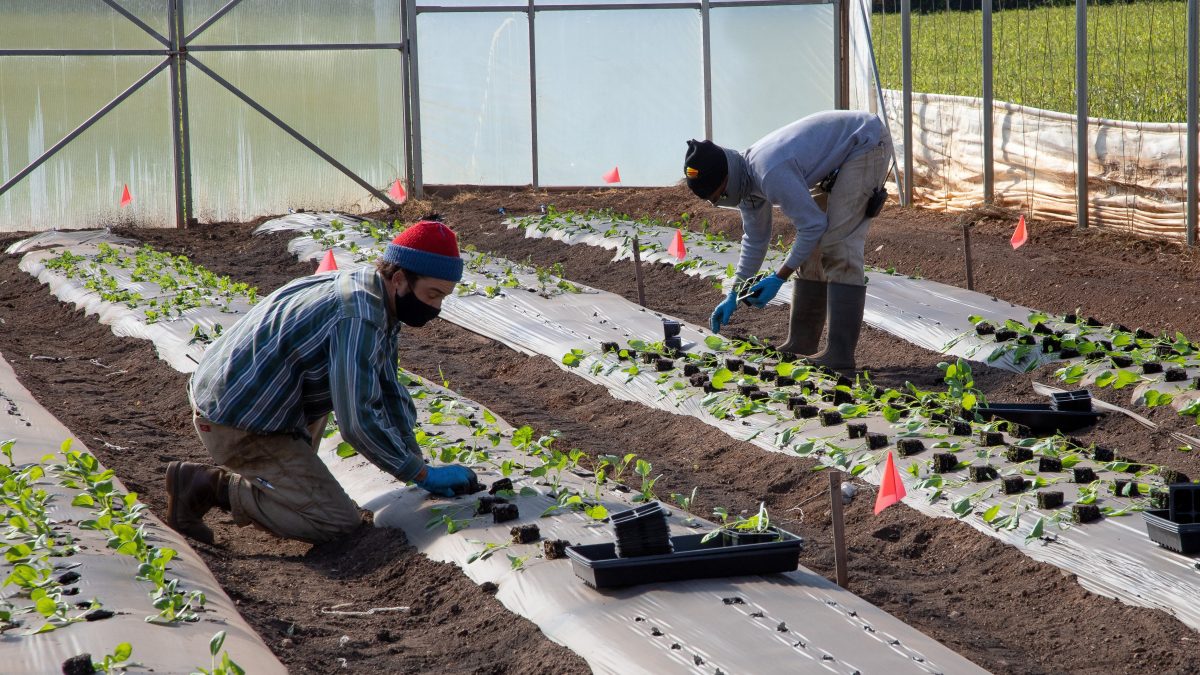Time to Harvest Ag Labor Reform That Works for All
TOPICS
Labor ShortageZippy Duvall
President

photo credit: North Carolina Farm Bureau, Mark Stebnicki, Used with Permission
Zippy Duvall
President
“Now Hiring” signs keep cropping up all over farm country—especially in the last several months as the job market shifts with more businesses reopening. Wherever you go, there are jobs to fill. I see these signs in my home state of Georgia and on farms I visit across the country. Every corner of farm country is impacted by our ongoing labor crisis, and it continues to be the leading concern I hear from farmers across the country. The crops, the soil and terrain might look different, but the story is the same: “We cannot find enough workers, and we don’t know how we’ll keep the farm going if we don’t have access to the help we need.”
It’s hard not to be frustrated by this long-standing challenge, especially when I hear directly from the men and women struggling to fill jobs on their farms. However, these workforce shortages are nothing new for farmers and ranchers. Demand for H-2A visas has steadily increased over the last 10 years, as farmers struggle to find employees in the U.S. to fill open positions on their farms. In fact, applications for H-2A positions on farms have tripled in the last decade, but this doesn’t mean our guestworker program is working fine. The reality is farmers who currently use the program do so because they have no other options, and those engaged in year-round agriculture such as dairy or livestock production aren’t able to access the program due to outdated laws.
Keeping our farms and ranches running is critical in all seasons to protect our nation’s food supply.
Our guestworker program has been broken for decades, with farmers caught in the political crossfire of this complex issue. But unlike so many challenges in agriculture that are beyond our control like weather and markets, this is a problem that can be solved. Like anything worth doing well, it might not be easy, but we can find a path forward. That is why the American Farm Bureau is working closely with the Senate to bring forward a bipartisan solution that finally resolves our agricultural labor crisis.
No one questioned agriculture being an essential industry last spring and summer as store shelves emptied. But keeping our farms and ranches running is critical in all seasons to protect our nation’s food supply. It makes no sense to recognize agriculture is essential but then fail to recognize agriculture’s workforce is essential. Food only makes it to your dinner table when we have the help we need to raise and harvest it.
Farmers need a guest worker program that allows them to hire workers for both seasonal and year-round farm work, while keeping their businesses economically viable. We need an agricultural guestworker program that provides enough flexibility and access for all of agriculture.
Farmers pay competitive wages for an honest day’s work, but the reality is most domestic workers are not interested in farm jobs. Farm work is hard and often transitory. I regularly hear, “Well, if farmers would just pay more, they would get the workers they need.” In fact, farm wages have increased disproportionately to farmers’ share of the food dollar. For example, the Adverse Effect Wage Rate, the rate used to set wages for the H-2A program, has increased 20% nationally over the last five years. Meanwhile revenues for fruits and nuts only increased 1% and revenues for vegetables and melons declined by 5% in that same time. With margins so slim, farmers are finding it more and more difficult to remain viable.
Farmers are also deeply concerned about the future of our current employees. On family farms like mine, employees become like family. We must ensure the stability of our current workforce. Our broken immigration system has led to an increased rate of undocumented workers in agriculture and other industries. No one can turn back time, but we can give these hard workers the opportunity to make things right and gain legal status while continuing their important work in agriculture. It would be senseless and crippling to our food system to embrace an enforcement only approach to immigration without fixing the guestworker program and providing a path forward for undocumented workers and their families.
We cannot afford as an industry or as a nation to put off finally achieving meaningful immigration reform. If farmers can’t fill the jobs on their farms, those “Now Hiring” signs will slowly change to “For Sale” signs as production moves out of the U.S.
We have seen great achievements for our farms and our nation when our leaders come across the aisle and work in a bipartisan fashion. But it is also critical that any legislation from the Senate doesn’t create more problems for farmers down the road. It’s time for lawmakers to come to the table and find a real solution that finally gets this right for the security of our food supply, the jobs depending on our industry, and the sustainability of our farms and ranches.
Zippy Duvall
President
Vincent “Zippy” Duvall, a poultry, cattle and hay producer from Greene County, Georgia, is the 12th president of the American Farm Bureau Federation.
Top Issues
VIEW ALL